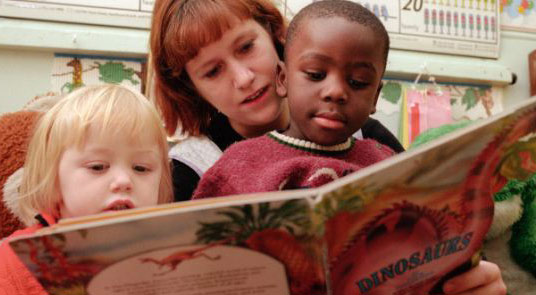|
 Same old stories: Children remember more new words if they hear a repetition of the same books |
|
It's the bedtime ritual every parent dreads - being asked to read the same book for the umpteenth time. But while the constant repetition might be mind-numbing for mum or dad, it is the best way for toddlers to learn new words, according to research. The findings suggest parents are wasting money by spending a fortune on huge book collections in the hope they will inspire their little ones. Instead, a small selection of favourites such as The Very Hungry Caterpillar or The Gruffalo will achieve far more. Dr Jessica Horst, of the University of Sussex’s WORD Lab devised an experiment to check how quickly three-year-olds could recognise and recall six new words. The children were visited three times in a week at their homes. One group heard the same story three times back-to-back each time and another was read three different stories. All had the same amount of new words which appeared the same number of times. When researchers returned a week later, they found the children who heard the same story over and over had typically learned 3.6 of the new words. Those that were exposed to a variety of stories remembered only 2.6. The also noted the ‘repetition’ group learned at a faster rate than those in the ‘variety’ group. Dr Horst said: ‘We are showing that less is more, to a point. Obviously, the more times you read to a child and the more books you have will help them. But you don’t need to go crazy and buy every single Thomas the Tank Engine book. Reading the same books over and over again helps.’ Previous studies have found parents spend just 49 minutes doing things with their children each day. One in three don’t read to their children before putting them to bed at night. Yet 30 minutes of one-on-one literacy sessions can improve reading age by nearly two years in less than five months. (Source: Dailymail)
|
这是让每个父母都头疼的睡前惯例——被孩子央求把同一本书念上第N次。 研究指出,尽管不断重复念同一本书可能让妈妈或爸爸感觉头脑麻木,但这是幼童学习新词汇的最佳方法。 研究结果显示,那些为了启迪孩子心智而花很多钱购买收藏大量图书的父母们是在浪费钱。 事实上,买上几本孩子们最喜欢的图书,例如《好饿的毛毛虫》或《咕噜牛》,收效会大得多。 萨塞克斯大学词语实验室的杰西卡•霍斯特博士设计了一个实验,以了解三岁大的幼童能多快地识别和记忆六个新单词。 研究人员每周去这些幼童的家做三次访问。 其中一组幼童每次把同一个故事连续听三遍,另一组幼童每次听到三个不同的故事。这些故事都含有同样多的新词,这些新词出现的次数也一样多。 当研究人员一周后回访时,他们发现反复听同一个故事的小孩通常可以学到3.6个新单词。 那些听不同故事的小孩只能记住2.6个新单词。 研究人员还注意到,“反复”组的小孩学得比“多样”组的小孩更快。 霍斯特博士说:“我们的研究显示,在某种程度上,少即是多。显然,你给孩子念书的次数越多,你拥有的书越多,对孩子也会有所裨益。但你没必要疯狂地买下《火车头托马斯》系列的每一本书。反复念同一本书将对孩子有益。” 先前的研究发现,父母们平均每天只花49分钟陪伴自己的小孩。三分之一的父母在晚上安顿小孩睡觉前不给他们念书。然而,每天30分钟一对一的念书时间在不到五个月内就能让小孩的阅读年龄提早近两年。 相关阅读 (中国日报网英语点津 陈丹妮 编辑:Julie) |
|
Vocabulary: the umpteenth time: 第无数次 back-to-back: 连续的;紧接的 one-on-one: 一对一的 |
